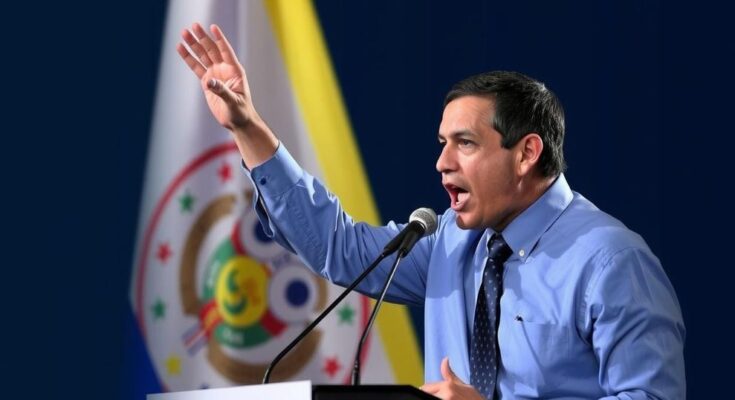Álvaro Delgado conceded defeat to Yamandú Orsi in Uruguay’s presidential runoff, with Orsi, of the center-left Broad Front, receiving 784,523 votes to Delgado’s 771,434. Orsi’s victory signals a return to the Broad Front’s governance, emphasizing a moderate approach to addressing pressing economic and social issues, while reflecting broader trends of voter dissatisfaction globally. Orsi aims for continuity rather than radical transformations.
In a closely contested presidential runoff in Uruguay, Álvaro Delgado, the conservative coalition candidate, conceded defeat to Yamandú Orsi of the center-left Broad Front, despite the ongoing vote count. Delgado acknowledged Orsi’s victory, stating, “with sadness, but without guilt, we can congratulate the winner.” Orsi, a former history teacher and mayor with a working-class background, garnered 784,523 votes against Delgado’s 771,434, after more than half of the ballots were counted. This outcome marks a significant political shift back to the Broad Front, which previously held power for 15 years before the center-right party’s election in 2020.
As Uruguay navigates a challenging economic landscape post-pandemic, Orsi’s win reflects broader global frustrations with incumbent parties. However, he aims to lead from the center, emphasizing continuity rather than radical change. Both candidates sought to address poverty and crime while outlining plans for fiscal responsibility. Orsi’s proposed policies include tax incentives for investment and reforms to social security aimed at lowering the retirement age, although these measures do not meet the extensive reforms some labor unions advocate.
Former President José Mujica, who was instrumental in the Broad Front’s previous achievements, endorsed Orsi, praising Uruguay’s democratic institutions. The election outcome signifies a rejection of the current government’s handling of economic stagnation and crime rates, leading to a hard-fought transition in leadership. In an era marked by distrust in traditional politics, Orsi emphasizes collaboration, stating, “The essence of politics is agreements.” This election showcases Uruguay’s ongoing commitment to political stability and democratic values as it moves forward under new leadership.
Uruguay has a tradition of political stability, characterized by moderate candidates and collaborative governance. The Broad Front, which last held power from 2005 to 2020, is renowned for significant social reforms, including the legalization of abortion and same-sex marriage, which drew international acclaim. The recent election highlights Uruguay’s response to a global trend of voter dissatisfaction with incumbent parties following economic hardships exacerbated by the COVID-19 pandemic. Yamandú Orsi represents a continuation of the Broad Front’s legacy, promising to manage policies that balance fiscal prudence with social welfare. His approach is informed by decades of political history and aims to address pressing issues such as poverty and crime, reflecting the electorate’s desires for practical solutions over radical changes. In contrast, the outgoing administration under Luis Lacalle Pou faced criticisms of economic stagnation and rising crime, which likely influenced voter preference.
The 2023 presidential runoff in Uruguay signifies a noteworthy political transition as Yamandú Orsi of the Broad Front emerges as the new leader following Álvaro Delgado’s concession. This election not only re-establishes the Broad Front’s governing presence after a brief conservative tenure but reflects broader global patterns of voter dissatisfaction with the status quo. As Uruguay faces economic challenges, Orsi’s moderate platform suggests a focus on continuity and cooperation rather than drastic reforms, aiming to unite the country under shared goals of social welfare and stability.
Original Source: www.pbs.org




